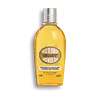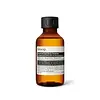What's inside
What's inside
 Key Ingredients
Key Ingredients

No key ingredients
 Benefits
Benefits

 Concerns
Concerns

 Ingredients Side-by-side
Ingredients Side-by-side

Vitis Vinifera Seed Oil
EmollientTipa-Laureth Sulfate
CleansingLaureth-3
EmulsifyingCaprylic/Capric Triglyceride
MaskingParfum
MaskingCocamide Mea
EmulsifyingPropylene Glycol
HumectantSorbitan Oleate
EmulsifyingPrunus Amygdalus Dulcis Oil
Skin ConditioningCitrus Aurantium Bergamia Fruit Oil
MaskingHelianthus Annuus Seed Oil
EmollientRosmarinus Officinalis Leaf Extract
AntimicrobialTocopherol
AntioxidantWater
Skin ConditioningLimonene
PerfumingCoumarin
PerfumingLinalool
PerfumingVitis Vinifera Seed Oil, Tipa-Laureth Sulfate, Laureth-3, Caprylic/Capric Triglyceride, Parfum, Cocamide Mea, Propylene Glycol, Sorbitan Oleate, Prunus Amygdalus Dulcis Oil, Citrus Aurantium Bergamia Fruit Oil, Helianthus Annuus Seed Oil, Rosmarinus Officinalis Leaf Extract, Tocopherol, Water, Limonene, Coumarin, Linalool
 Reviews
Reviews

Ingredients Explained
These ingredients are found in both products.
Ingredients higher up in an ingredient list are typically present in a larger amount.
Citrus Aurantium Bergamia Fruit Oil is the oil from the bergamot orange. It is native to Italy.
This ingredient is used to add fragrance to products. It contains limonene, linalool, and linalyl acetate.
The term 'fragrance' is not regulated in many countries. In many cases, it is up to the brand to define this term. For instance, many brands choose to label themselves as "fragrance-free" because they are not using synthetic fragrances. However, their products may still contain ingredients such as essential oils that are considered a fragrance.
When used topically, Citrus Aurantium Bergamia Fruit Oil is a photosensitizer due to its furanocoumarins. Photosensitizers make the skin and eyes much more sensitive to sunlight. Photosensitizers are linked to skin cancer.
However, more cosmetics using Citrus Aurantium Bergamia Fruit Oil are removing the furanocoumarins.
Bergamot oil was also found to have anti-inflammatory, antibacterial and antifungal properties.
Learn more about Citrus Aurantium Bergamia Fruit OilLimonene is a fragrance that adds scent and taste to a formulation.
It's found in the peel oil of citrus fruits and other plants such as lavender and eucalyptus. The scent of limonene is generally described as "sweet citrus".
Limonene acts as an antioxidant, meaning it helps neutralize free radicals.
When exposed to air, oxidized limonene may sensitize the skin. Because of this, limonene is often avoided by people with sensitive skin.
The term 'fragrance' is not regulated in many countries. In many cases, it is up to the brand to define this term. For instance, many brands choose to label themselves as "fragrance-free" because they are not using synthetic fragrances. However, their products may still contain ingredients such as essential oils that are considered a fragrance.
Learn more about LimoneneLinalool is a fragrance and helps add scent to products. It's derived from common plants such as cinnamon, mint, citrus, and lavender.
Like Limonene, this ingredient oxidizes when exposed to air. Oxidized linalool can cause allergies and skin sensitivity.
This ingredient has a scent that is floral, spicy tropical, and citrus-like.
Learn more about LinaloolWater. It's the most common cosmetic ingredient of all. You'll usually see it at the top of ingredient lists, meaning that it makes up the largest part of the product.
So why is it so popular? Water most often acts as a solvent - this means that it helps dissolve other ingredients into the formulation.
You'll also recognize water as that liquid we all need to stay alive. If you see this, drink a glass of water. Stay hydrated!
Learn more about Water